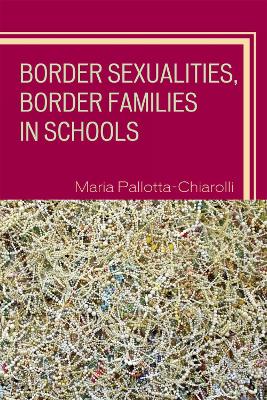Curriculum, Cultures, and (Homo)Sexualities
1 total work
The first book of its kind internationally, Border Sexualities, Border Families in Schools explores the experiences of bisexual students, mixed sexual orientation families, and polyamorous families in schools. For the first time, a book foregrounds the voices and experiences of these students and families who are "falling into the gaps" or on the borders of a school's gay/straight divide in anti-homophobia policies and programs, and schools recognizing families as meaning either heterosexual couples, or, increasingly, homosexual couples.
Drawing from interviews and online research with students, parents, and teachers, as well as providing a comprehensive overview and analysis of international educational and health research, and media/popular cultural texts, this book addresses the following:
· what are the problematic and/or empowering experiences and strategies of bisexual students, multisexual and polyamorous families in educational systems ?
· what could schools be doing to promote healthy sexual, emotional and social relationships for bisexual students and multisexual/polyamorous families in school communities?
· what recommendations/implementations do bisexual students and multisexual/polyamorous families suggest in regard to school curriculum, school policies, and student welfare in order to acknowledge and support family diversity in school communities?
In particular, the research findings which are reported in this book show that "border sexualities" and "border families" use three types of strategies:
· passing or normalization and assimilation in school settings;
· bordering or negotiation and navigation between the private world of home and public world of school; and
· polluting or non-compliance and resistance, thereby outing their sexualities and families within the school world.
Within a social deconstructionist, multicultural, post-colonial, feminist, queer theoretical framework, this book spans health, education, sociology, psychology, gender, family, sexuality and cultural studies.
Drawing from interviews and online research with students, parents, and teachers, as well as providing a comprehensive overview and analysis of international educational and health research, and media/popular cultural texts, this book addresses the following:
· what are the problematic and/or empowering experiences and strategies of bisexual students, multisexual and polyamorous families in educational systems ?
· what could schools be doing to promote healthy sexual, emotional and social relationships for bisexual students and multisexual/polyamorous families in school communities?
· what recommendations/implementations do bisexual students and multisexual/polyamorous families suggest in regard to school curriculum, school policies, and student welfare in order to acknowledge and support family diversity in school communities?
In particular, the research findings which are reported in this book show that "border sexualities" and "border families" use three types of strategies:
· passing or normalization and assimilation in school settings;
· bordering or negotiation and navigation between the private world of home and public world of school; and
· polluting or non-compliance and resistance, thereby outing their sexualities and families within the school world.
Within a social deconstructionist, multicultural, post-colonial, feminist, queer theoretical framework, this book spans health, education, sociology, psychology, gender, family, sexuality and cultural studies.
